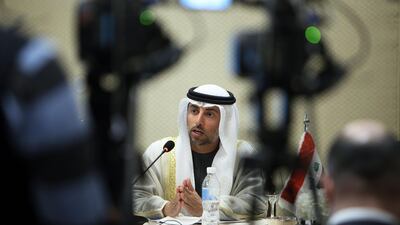The UAE and Saudi Arabia’s energy ministers reaffirmed commitments to oil trading in the US dollar following speculation Saudi Arabia would trade in a different currency amid pending US legislation to hinder Opec.
“The trading in the US dollar is something that you don’t change overnight,” UAE Minister of Energy and Industry Suhail Al Mazrouei said on the sidelines of the Middle East Petroleum & Gas Conference (MPGC) in Dubai. “I think that [has been] a norm in the industry for years and years so let’s not jump into some of those ideas … Opec did not claim that they will change the currency in trading.”
Later on Monday, Saudi Arabia’s Energy Minister Khalid Al Falih said in a statement that reports that the kingdom was threatening to sell its oil in currencies other than the US dollar are “inaccurate” and do not reflect its position on the matter.
The energy ministry said that Saudi Arabia would not risk its key policy priority - to be a stabilising force for global energy markets – by implementing a fundamental change to the financial terms of oil trading in its relationships around the world.
"The kingdom has been trading its oil in dollars for decades, which has served the objectives of its financial and monetary policies well,” the statement said.
According to an earlier Reuters report, Saudi Arabian sources warned that the kingdom may start selling its oil in currencies other than the US dollar if Washington passes a bill exposing Opec members to US anti-trust lawsuits.
The report said that the option had been discussed internally by senior Saudi energy officials in recent months and the plan had even been discussed with Opec members and communicated to senior US energy officials.
While the chances of the US bill known as "Nopec" coming into force are slim and Saudi Arabia would be unlikely to change its oil trading currency, the fact that Riyadh was considering such a drastic step was taken as a sign of the kingdom’s annoyance about potential US legal challenges to Opec.
Kuwait's Opec governor Haitham Al Ghais said moving away from US dollar oil trading would have wider economic implications and while his country in the past had de-pegged its currency the Kuwaiti dinar from the US dollar and moved to a currency basket it had no immediate plans to do this for its oil trading. “Obviously this has wider economic implications and we haven’t really looked into it so I can’t really tell you if it will appeal to us or not,” Mr Al Ghais said. “This is not something we’ve considered honestly ... We haven’t even explored it or thought about it.”
He added Kuwait is monitoring (Nopec) and is concerned but action is being taken at a government level.
“Obviously we are also very pleased about the comments that we heard about [US secretary of energy] Perry a few weeks ago when he commented about Nopec that the US administration would have to consider it very carefully before it became effective legislation that’s very encouraging.”
Mr Al Ghais said Kuwait is also studying and analysing this the moves being made by the major producers such as like Saudi Aramco on moving benchmarks.
“This is something we’re carefully studying and analaysing we are meeting with people, talking to our clients and once we have a conclusive position about whether this benefits us and is in our long term interests either we decide to stay or move,” he said.
Mr Al Mazrouei reiterated the UAE’s commitment to do its part in the country’s production cut allocation.
“We are committed to do it 100 per cent,” Mr Al Mazrouei said, noting Opec and Opec+ are working hard to balance the market despite geopolitical issues in Libya and sanctions in Venezuela and Iran.
The UAE’s output at the end of January, according to secondary sources cited by Opec, was 3.078 million barrels per day. Opec producers led by Saudi Arabia and members outside the alliance led by Russia, known as Opec+, agreed in December to restrict production by 1.2 million bpd for six months starting January.
The curbs were a response to the dramatic fall in oil prices, which had surged to a three-year high of $86.29 per barrel in October, only to plunge by 40 per cent in December.
Mr Al Mazrouei said liquefied natural gas (LNG) is now flourishing as a target commodity for many economies as countries strive to diversify into more environmentally-friendly energy options. This signals a shift from oil to gas and from gas into renewable energy.
While traditionally IOCs have not been incentivised to focus on gas because of its lower price, there is now increasing GCC focus on developing LNG.
“Interestingly, we are looking to increase local gas price … not just the UAE, but Oman, Saudi Arabia and Kuwait – every country that has gas they are looking to increase their price of gas through reforms,” Mr Al Mazrouei said.
“Now we are looking at reforms in electricity and at $5 price for gas – this price is almost double what you have in the US,” he said, adding the price would not be fixed and subject to market fluctuations.

